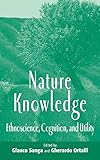Nature Knowledge: ethnoscience, cognition, and utility / edited by Glauco Sanga and Gherardo Ortalli
Sanga, Glauco [editor] | Ortalli, Gherardo [editor].
Tipo de material: Libro
impreso(a)
Editor: New York, New York, United States: Berghahn Books Istituto Veneto di Scienze, Lettere ed Arti, 2004Descripción: xii, 417 páginas ; 23 centímetros.Tipo de contenido: Texto Tipo de medio: Sin medio Tipo de portador: VolumenISBN: 1571818227; 1571818235.Tema(s): Etnobiología
Libro
impreso(a)
Editor: New York, New York, United States: Berghahn Books Istituto Veneto di Scienze, Lettere ed Arti, 2004Descripción: xii, 417 páginas ; 23 centímetros.Tipo de contenido: Texto Tipo de medio: Sin medio Tipo de portador: VolumenISBN: 1571818227; 1571818235.Tema(s): Etnobiología| Tipo de ítem | Biblioteca actual | Colección | Signatura | Estado | Fecha de vencimiento | Código de barras |
|---|---|---|---|---|---|---|
| Libros |
Biblioteca San Cristóbal
Texto en la configuración de la biblioteca San Cristóbal |
Acervo General | 578.6 N3 | Disponible | ECO010020188 |
Incluye bibliografía e índice: páginas 405-417
List of Illustrations.. List of Tables.. Preface and Acknowledgements.. List of Abbreviations.. List of Contributors.. Introduction.. Part I: Classification.. Recognition and Classification of Natural Kinds.. 1. How a Folk Botanical System can be both Natural and Comprehensive: One Maya Indian’s View of the Plant World.. 2. Arbitrariness and Necessity in Ethnobiological Classification: Notes on some Persisting Issues.. 3. Tackling Aristotelian Ethnozoology.. 4. Current and Historical Problems in Classification: Levels and Associated Themes, from the Linguistic Point of View.. Part II: Naming.. The Ways of Naming Nature and Through Nature.. 5. The Role of Motivation (“iconymy”) in Naming: Six Responses to a List of Questions.. 6. Tapir and Squirrel: Further Nomenclatural Meanderings Toward a Universal Sound-symbolic Bestiary.. 7. Jivaro Streams: from Named Places to Placed Names.. 8. What is Lost When Names are Forgotten?.. 9. Examples of Metaphors from Fauna and Flora.. 10. Lexicalization of Natural Objects in Palawan.. 11. Levels and Mechanisms of Naming.. Discussion.. Part III: Thought.. The Symbolic Uses of Nature.. 12. Thought of Nature and Cosmology.. 13. Symbolic Anthropology and Ethnoscience: Two Paradigms.. 14. Doing, Thinking, Saying.. 15. Thought, Knowledge, and Universals.. 16. Bodily Humors in the Scholarly Tradition of Hindu and Galenic Medicine as an Example of Naive Theory and Implicate Universals.. Discussion.. Part IV: Use.. How have We come to Use Nature, from a Practical Point-of-view?.. 17. Indigenous Knowledge: Subordination and Localism.. 18. Indigenous Environmental Knowledge, the History of Science, and the Discourse of Development.. 19. Two Reflections on Ecological Knowledge.. 20. Indigenous Knowledge and Cognitive Power.. 21. The Role of Indigenous Knowledge Systems in Facilitating Sustainable Approaches to Development.. Discussion.. Part V: Conservation.. What does it Mean to Conserve Nature?.. 22. Random Conservation and Deliberate Diffusion of Botanical Species: Some Evidence out of the Modern European Agricultural Past.. 23. Diversity, Protection, and Conservation: Local Agricultural Products and Foodstuffs.. 24. Cultural Research on the Origin and Maintenance of Agricultural Diversity.. 25. Activation Practices, History of Environmental Resources, and Conservation.. 26. Forms of Knowledge in the Conservation of Natural Resources: from the Middle Ages to the Venetian “Tribe”.. Discussion.. Index
Numerous scholars, in particular anthropologists, historians, economists, linguists, and biologists, have, over the last few years, studied forms of knowledge and use of nature, and of the ways nature can be protected and conserved. Some of the most prominent scholars have come together in this volume to reflect on what has been achieved so far, to compare the work carried out in the past, to discuss the problems that have emerged from different research projects, and to map out the way forward. eng
